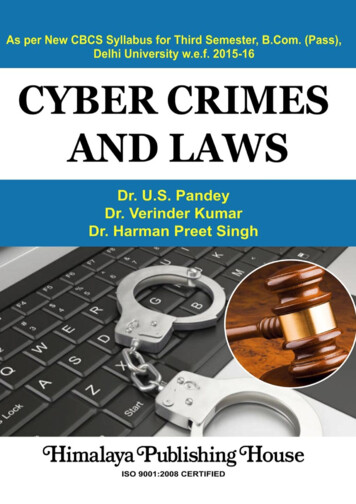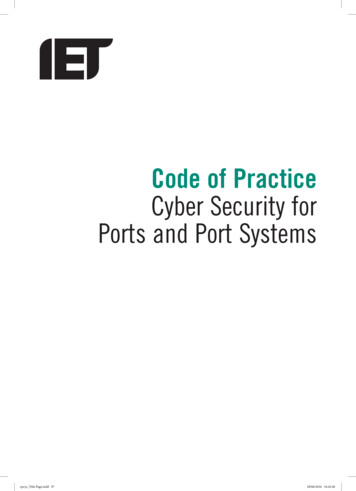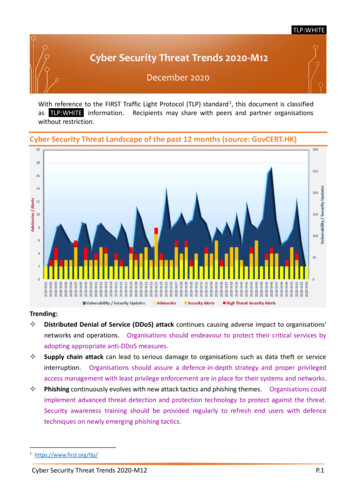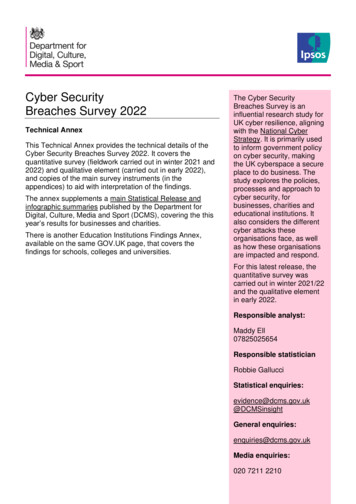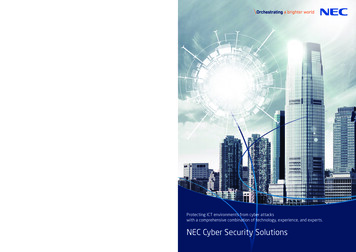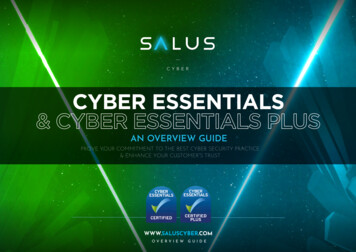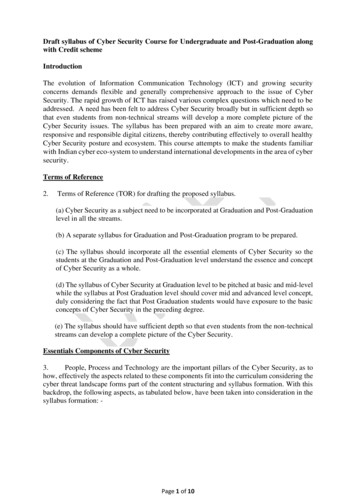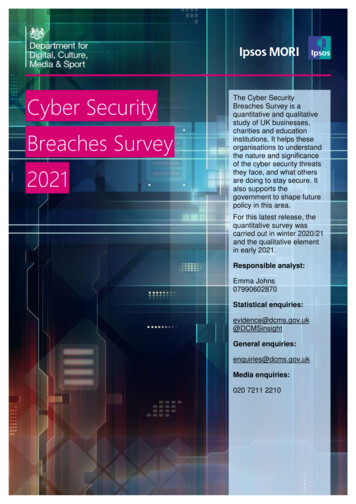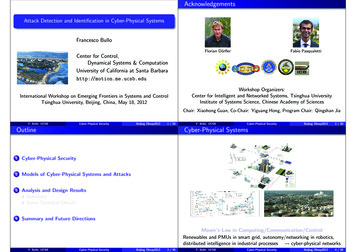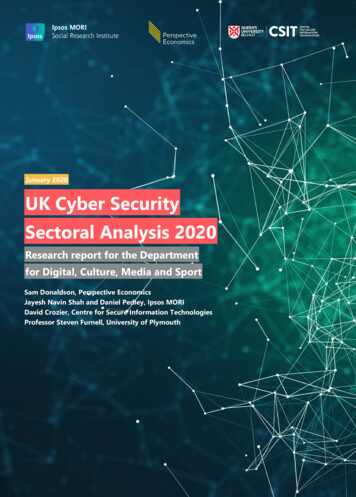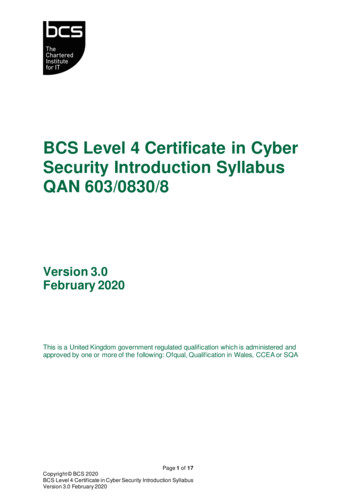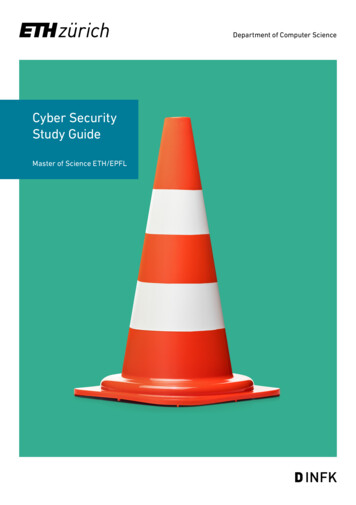
Transcription
Department of Computer ScienceCyber SecurityStudy GuideMaster of Science ETH/EPFL
Master’s Programme inCyber Security ETH Zurich – EPFLStudy GuideProgramme Regulations 2019RSETHZ 324.1.1600.30D-INFK / October 2022
Table of Contents1Introduction1.11.22General Information1.2.1Course g for Examinations1.2.5Grading System1.2.6Student Exchange Programme688889910Master’s Programme2.13Study Administration and Student Advisory ServicesMaster’s Programme Structure2.1.1Core Courses and Electives in Cyber Security2.1.2Seminar2.1.3Core Courses and Electives in a Minor2.1.4Inter Focus Courses2.1.5Mandatory Semester at EPFL2.1.6Semester Project2.1.7Free Electives2.1.8Science in Perspective2.1.9Internship2.1.10Master’s Thesis2.1.11Grade Point Average1213131313141414141515152.2Study Duration162.3Master’s Degree16Planning the Master’s Studies3.1Personal Study Plan173.2Tutor System173.3Enrolment for Courses and Examinations183.4Admission and Registration for the Master’s Thesis193.5Master’s Degree Request20
6Cyber Security Study Guide1 IntroductionThis document contains important information for a successful completion ofthe joint Master’s programme ETH Zurich – EPFL in Computer Science Majorin Cyber Security at ETH, offered by the Department of Computer Science(D-INFK). It comprises a short description of the Master’s programme structure and other essential information on how to plan the studies.Prospective and current students are asked to read this document carefully,as it will help them to choose courses and plan their personal study programme. It is the student’s responsibility to meet the requirements of theprogramme. Should any questions arise, please contact one of the personsbelow for further advice.1.1 Study Administration and Student AdvisoryServicesFor questions not covered by this study guide, the Department of ComputerScience (D-INFK) offers various services. For names and addresses of thefollowing officials, see the inside front cover.– The D-INFK Director of Studies is responsible for the degree programmes,examination regulations and the validation of examination results. All requests addressed to the Director of Studies must be submitted to the Studies Administration Office in written form.– The D-INFK Studies Administration Office can help with most study-relatedissues, in particular with administrative concerns. In any case, it can referstudents to the right person.– For questions concerning military service (only Swiss military service), theStudies Administration Office may be consulted as well.– For questions on study planning, please contact the D-INFK Student Coordinator.
Master of Science ETH/EPFL– Students interested in studying abroad, please contact the D-INFK StudentExchange Advisor of the Department of Computer Science and the StudentExchange Office (see section 1.2.6).– The Psychological Counselling Service offers a variety of services for confidential assistance with personal and academic problems; for example, howto deal with demanding situations such as examinations. It is advantageousto seek help at an early stage. The Psychological Counselling Service is freeof charge for all students enrolled at ETH Zurich.The Verein der Informatik Studierenden (VIS) is the computer science student union at ETH Zurich (www.vis.ethz.ch). One of its valuable services isto collect and provide previous examination papers for the purpose of exampreparation. VIS also organises several events, such as barbecues and a skicamp in winter. Furthermore, VIS helps networking, organises excursions tocompanies and provides contacts for internships.VIS is part of VSETH, the overall student’s association. As such, when a student becomes a registered VSETH member (check the VSETH box on the registration form), they automatically become a VIS member as well. VIS requiresthe active assistance of students and encourages them to become a memberof the organising committee. The VIS office is found in CAB E 31 and is alwaysopen for a coffee and a chat. More information can be found here:www.vis.ethz.chMoEB (Committee for Master’s students without an ETH Bachelor’s degree).MoEB is a section of VIS. It was founded to support Master’s students withoutan ETH Bachelor’s degree by representing their interests within the department and by offering activities to integrate them into the student community.More information can be found at: www.vis.ethz.ch/moeb7
8Cyber Security Study Guide1.2 General Information1.2.1 Course CatalogueAll courses are listed in ETH’s Course catalogue: www.vvz.ethz.ch. Studentswill find further information about the objective, content, teaching language,time schedule and localities of the courses, as well as details about the examination and the number of credits awarded after successful completionof the courses.1.2.2 CreditsAll study programmes at ETH are based on the European Credit TransferSystem (ECTS). For a Master’s degree ETH Zurich – EPFL in Computer ScienceMajor in Cyber Security, the acquisition of 120 ECTS credits is required. Thenumber of credits assigned to a course is determined by the number (#) ofweekly hours spent in lectures (V), in exercises (U), in lectures combined withexercises (G), in laboratories (P) and additional self-study (A).1.2.3 AssessmentsAny method to evaluate the achievements of students on a course can serveas an assessment. Most courses, however, rely on examinations. Examinationsmay take place at the end of the semester (end-of-semester examinations) orat the end of the semester break (examination session).End-of-semester examinations are organised by the department. Studentsare informed of the dates by the lecturers themselves or by the Studies Administration Office. The examination sessions are organised by ETH’s Examinations Office and students will be informed via myStudies (see also chapter 3.3)and email.Repetition of a failed examination is possible only after re-enrolment and fullparticipation in the relevant course. An examination may be taken only twice.The type of examination (end-of-semester/session examination), the examination mode (oral/written form) and the duration are announced in the course
Master of Science ETH/EPFLcatalogue (www.vvz.ethz.ch). For further information, please contact the Studies Administration Office of D-INFK.1.2.4 Preparing for ExaminationsSolving the exercises accompanying a given course is not always mandatory.Nevertheless, we strongly encourage students to make the effort, as it is thebest way to prepare for the examination. VIS (CAB E31) offers a collection ofold examination papers. In general, the style of examinations does not changemuch from one year to another, particularly if the course is taught by the sameprofessor. Therefore, it is worth taking a close look at old papers.1.2.5 Grading SystemThe grading scale at ETH ranges from 1.0 to 6.0 in quarter grade steps (0.25).The pass grade is 4.0 and the maximum grade is 6.0. The numerical gradescorrespond to the following predicates:GradeMeaning6Excellent (the best possible grade)5Good4Sufficient (the lowest passing grade)3Insufficient (fail)2Poor1Very poor (the lowest possible grade)For some courses, a pass/fail rating is used instead of grades.Credits are awarded only if the course requirements have been fulfilled andthe associated examinations have been passed successfully. If a course hasbeen completed successfully, the full number of credits is awarded independently of the grade obtained.9
10Cyber Security Study Guide1.2.6 Student Exchange ProgrammesInternational experience, cross-cultural competence and language skillsare becoming increasingly important in today’s business world. The StudentExchange Office organises study placements for ETH students who hold aBachelor’s degree from ETH Zurich at partner universities in Switzerlandand abroad within the student exchange programmes and various bilateralagreements.Students interested in studying abroad should contact the D-INFK StudentExchange Advisor and ETH’s Student Exchange Office. However, courses taken in an exchange semester do not count towards the Master’s degree. Themandatory semester at EPFL is a part of the programme and does not countas an exchange semester.
Master of Science ETH/EPFL2 Master’s ProgrammeCyber security is a cornerstone of the information society. The consecutiveETH Master’s programme in Cyber Security is a two-year programme thatoffers a thorough education in cyber security topics, such as information security, system security, network security and cryptography. The programmeis offered in collaboration with EPFL. Students enrolled in the programmecomplete a semester at EPFL.The specialist Master’s programme in Cyber Security offers a broad set ofcourses from all areas of cyber security. To complement these subjects, students choose an area in computer science as a minor, such as Data Management Systems, Machine Intelligence, Visual and Interactive Computing orTheoretical Computer Science. A semester project and the Master’s thesisprovide students with an opportunity to apply their knowledge and skills. TheMaster’s programme structure is described in detail in the following chapters.11
12Cyber Security Study Guide2.1 Master’s Programme StructureThe Master’s programme in Cyber Security is divided into several coursecategories as shown in Figure 1. The minimum numbers of credits requiredfor completion of the degree are listed in the fields of the course categories.Several course categories are nested to provide more flexibility, as the leastnumber of credits required within subordinate course categories do not sumup to the least number of credits required for the superordinate course category. The remaining credits can be distributed freely over all subordinatecourse categories. See chapter 2.1.1ff for a detailed description of the coursecategories.Master ETH Zurich – EPFL in Computer ScienceMajor in Cyber Security Core Courses and Electives in Cyber Security Core Courses Core ElectivesSeminar Core Courses and Electives in a Minor Core Courses Core Electives12028162188Inter Focus Courses 16Semester Project 12Free ElectivesScience in Perspective Master’s Thesis 230Figure 1: Course categories with the minimum number of credits required.
Master of Science ETH/EPFL2.1.1 Core Courses and Electives in Cyber SecurityThe Core Courses provide essential knowledge in Cyber Security and ensurea high level of competence. Elective Courses cover specialist topics.The Core Courses and Core Electives in Cyber Security are listed in the coursecatalogue (see chapter 1.2.1)2.1.2 SeminarIn seminars, students are trained in how to read and understand scientificpublications. Participants are expected to present a paper on a selected topicand contribute to the discussions following the presentations of other seminarattendees.2.1.3 Core Courses and Electives in a MinorStudents choose one area of computer science (other than Secure and ReliableSystems) as a minor. The objective of the Core Courses and the Elective Coursesis to complement the cyber security education; for instance, in applicationareas of security.The Core Courses and Electives of the chosen minor are listed in the coursecatalogue.2.1.4 Inter Focus CoursesThe Inter Focus Courses cover topics important to all computer scientists.They teach algorithmic reasoning – from real world problems to algorithmicmodelling to implementation – and introduce students to advanced systemsdesign issues.13
14Cyber Security Study Guide2.1.5 Mandatory Semester at EPFLStudents enrolled at ETH Zurich must start the Master’s programme in Zurich.During the course of the programme, one semester must be spent at EPFL,the Swiss Federal Institute of Technology in Lausanne, where students takecourses worth 20–35 credit points. Inter Focus Courses and the Master’s thesis must be taken at ETH Zurich. D-INFK defines one semester in advance thecourse categories of the courses at EPFL. Further details on how to plan andimplement the semester at EPFL, including logistics, are announced in duetime on the programme’s website.2.1.6 Semester ProjectThe Semester Project provides students with the opportunity to apply acquiredknowledge and skills. They can gain hands-on experience by independentlysolving a technical-scientific problem.2.1.7 Free ElectivesAll Master’s level courses in the area of computer science, or a closely relatedfield, offered by ETH Zurich, EPFL and the University of Zurich may be chosenas free elective courses. The acceptance of credit for courses at other Swissuniversities requires a written request to the Director of Studies.2.1.8 Science in PerspectiveTwo credits must be obtained at the Department of Humanities, Socialand Political Sciences (D-GESS). The course catalogue can be found at:www.gess.ethz.ch or www.vvz.ethz.ch (Programme: GESS Science inPerspective). Language courses offered by the language centre accreditedby GESS have an 851-xxxx-xx course-number. Students who have alreadyobtained their Bachelor’s degree at ETH can acquire a maximum of threecredits through a language course (including those credits obtained for theBachelor’s degree).
Master of Science ETH/EPFL2.1.9 InternshipAn internship provides an opportunity to gain experience in an industrial environment and creates a network of contacts.In order to register for an internship, students must submit a written requestto the Studies Administration Office containing the following details no laterthan two weeks before the beginning of the internship:– detailed job description: task, technology, milestones– start and end date of the internship (the minimum duration of an internshiplisted in the transcript must be 10 weeks)– supervisor’s name and academic degreeSince internships are conducted outside academic institutions, no creditsare assigned.If students need a work permit for their internship, the Studies Administration Office may issue a letter of support provided that at least the Inter FocusCourses and the Semester Project have been passed successfully.2.1.10 Master’s ThesisThe Master’s thesis demonstrates that students are able to use the knowledgeand skills acquired during their Master’s studies to solve a complex cybersecurity problem.2.1.11 Grade Point AverageThe grade point average (GPA) listed in the final academic record is theweighted average of all grades listed in the final transcript, where the numberof credits obtained in a course corresponds to the weight.15
16Cyber Security Study Guide2.2 Study DurationThe Master’s programme worth 120 credits should be completed in four semesters. In general, students follow a course load of 30 credits per semester.The overall study duration, including the Master’s thesis, may not exceed eightsemesters.2.3 Master’s DegreeThe Master’s degree in Cyber Security at ETH entitles graduates to the following academic title:Master of Science ETH Zurich – EPFL in Computer Science Major in CyberSecurity (MSc ETH Zurich – EPFL)
Master of Science ETH/EPFL3 Planning the Master’s StudiesThe following chapter outlines the main administrative aspects in order tohelp students plan their studies at ETH.3.1 Personal Study PlanIt is the student’s responsibility to plan their Master’s studies. D-INFK recommends that a personal study plan is established in order to structure thestudies. Please consult ETH’s course catalogue (www.vvz.ethz.ch) for detailedinformation on courses and course schedules of current and previous semesters. The courses offered and time schedules differ only slightly from year toyear. For courses offered at EPFL, please consult the published course booksat www.epfl.ch/schools/ic/cyber-securityPlease note the following guidelines:– The workload for one semester is about 30 ECTS credits.– The minimum number of credits required within each course category mustbe fulfilled (see chapter 2.1 for more information on the course categories).To help establish a personal study plan, a template can be found tml3.2 Tutor SystemAt the beginning of the study programme every student is assigned to a tutor determined by D-INFK. The tutor is a faculty member and advises thestudent in how to plan their studies. Students can find their assigned tutorin myStudies.17
18Cyber Security Study Guide3.3 Enrolment for Courses and ExaminationsStudents must enrol for the courses of the upcoming semester viawww.mystudies.ethz.ch with their nethz login. To ensure that they receive allinformation sent by the lecturer to students registered on the course, studentsshould enrol for the courses as soon as possible.Enrolling for a course does not automatically result in registration for thecorresponding examination. Students will be asked via email to register onlinethrough myStudies for an examination. After registration for an examination,the deadline for deregistration will be shown. Until this deadline, studentsmay deregister from an examination without the consequences. After thedeadline has passed, students can no longer deregister from the examination.Non-attendance of an examination for which a student has registered will begraded as failed. In the case of illness on the day of the examination, studentsmust provide a doctor’s certificate.
Master of Science ETH/EPFL3.4 Admission and Registration for theMaster’s ThesisThe Master’s thesis must be supervised by a professor in cyber security;theses under the supervision of other faculty members require permissionfrom a cyber security professor. D-INFK strongly recommends that studentsacquire all course credits before the start of their Master’s thesis. The thesisrequires six months of full-time study/work, during which time students arestrongly discouraged from attending any courses in parallel.The minimum prerequisites for registration are:– Completed Bachelor’s programme– All additional requirements completed (additional requirements, if any,are listed in the admission decree)– Master’s courses: Completed 28 credit points in the category Major Cyber Security, fromwhich at least 12 credit points must come from Core Coursesand Completed 16 credit points in the category Inter Focus Coursesand Completed 12 credit points in the category Semester Projectand At most 8 credit points missing in total in the categories Minor Courses,Free Electives and Science in PerspectiveBefore starting a Master’s thesis, it is important to agree with the supervisoron the task and the assessment scheme. Both have to be documented in detail.If problems should occur during the period of writing the Master’s thesis, thestudent and supervisor can then refer to this written agreement. The Master’sthesis is electronically registered in myStudies.In order to complete the Master’s thesis successfully, a grade of 4.0 or highermust be obtained. In the case of failure, the Master’s thesis can be repeatedonce. Note that for the second attempt, students must work on a differentproject than the first attempt.Further details on the internal regulations of the Master’s thesis can be downloaded at: www.inf.ethz.ch/studies/forms-and-documents.html19
20Cyber Security Study Guide3.5 Master’s Degree RequestWhen the Master’s degree requirements have been fulfilled, students mustlodge their diploma degree request. The degree request is available inmyStudies. The printed request must be signed and submitted to the StudiesAdministration Office. Students are asked to submit it personally, in order thatany potential problems with the request can be solved immediately. Performances can be assigned to two different sections:Section 1: Performances in the final transcriptAll successfully completed (passed) courses to be listed in the final transcriptshould be assigned to this section. Only courses in this section count towardsthe final GPA.Section 2: Performances in the addendumCourses assigned to this section are listed in the addendum of the finaltranscript and do not count towards the final GPA. This section includes:– Successfully completed courses not assigned to any category(Performances without a category)– Additional requirements– Failed performance assessmentsAfter submission of the request, the following documents will be issued: thefinal academic record, possibly with addendum, the diploma certificateand the diploma supplement. Note that deregistration from the Master’sprogramme is performed automatically.
Master of Science ETH/EPFL21
22Cyber Security Study GuideImportant addresses and contactsStudies in Cyber Securitywww.inf.ethz.ch/master-cybsecCourse cataloguewww.vvz.ethz.chRectorate ETH Zurich, HG BuildingRämistrasse 1018092 Zurich, dents-adminOffice HG F 19Mo–Fri, 11:00–13:00Phone 41 (0)44 632 30 00Mo–Fri, 09:00–11:00, 14:00–16:00Department of Computer Science ETH Zurich, CAB BuildingUniversitätstrasse 68092 Zurich, SwitzerlandDirector of Studies Prof. Zhendong Sumaster@inf.ethz.chStudy Coordinator Dr. Ralf SasseUNG F 15 / 41 (0)44 632 53 89ralf.sasse@inf.ethz.chStudies Administration Office Bernadette GianesiCAB F 62 / 41 (0)44 633 42 23master@inf.ethz.chStudent Exchange Dr. Claudia OttoCAB F 64.1 / 41 (0)44 633 71 26mobility@inf.ethz.chVIS Association of computer science studentsCAB E 31 / 41 (0)44 632 72 12vis@vis.ethz.chwww.vis.ethz.chCoaching Pascal KogelmannHG F 67.3, Rämistrasse hological Counselling ServiceBy appointment 41 (0)44 634 22 80pbs@ad.uzh.chwww.pbs.uzh.ch
Department of Computer ScienceStudies Administration Office 41 (0)44 633 42 23master@inf.ethz.chwww.inf.ethz.chETH ZurichDepartment of Computer ScienceUniversitätstrasse 6CAB F 628092 Zurich, Switzerland ETH Zurich, October 2022
6 Cyber Security Study Guide 1 Introduction This document contains important information for a successful completion of the joint Master's programme ETH Zurich - EPFL in Computer Science Major in Cyber Security at ETH, offered by the Department of Computer Science (D-INFK). It comprises a short description of the Master's programme struc -
